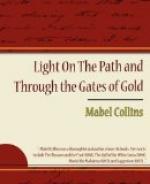thing, a being which cannot see its own light, a thing
of life which will not live, an astral animal which
has eyes, and ears, and speech, and power, yet will
use none of these gifts. This is the case, and
the habit of ignorance has become so confirmed, that
now none will see with the inner vision till agony
has made the physical eyes not only unseeing, but
without tears—the moisture of life.
To be incapable of tears is to have faced and conquered
the simple human nature, and to have attained an equilibrium
which cannot be shaken by personal emotions.
It does not imply any hardness of heart, or any indifference.
It does not imply the exhaustion of sorrow, when the
suffering soul seems powerless to suffer acutely any
longer; it does not mean the deadness of old age,
when emotion is becoming dull because the strings
which vibrate to it are wearing out. None of
these conditions are fit for a disciple, and if any
one of them exist in him it must be overcome before
the path can be entered upon. Hardness of heart
belongs to the selfish man, the egotist, to whom the
gate is forever closed. Indifference belongs
to the fool and the false philosopher; those whose
lukewarmness makes them mere puppets, not strong enough
to face the realities of existence. When pain
or sorrow has worn out the keenness of suffering,
the result is a lethargy not unlike that which accompanies
old age, as it is usually experienced by men and
women. Such a condition makes the entrance to
the path impossible, because the first step is one
of difficulty and needs a strong man, full of psychic
and physical vigor, to attempt it.
It is a truth, that, as Edgar Allan Poe said, the
eyes are the windows for the soul, the windows of
that haunted palace in which it dwells. This
is the very nearest interpretation into ordinary language
of the meaning of the text. If grief, dismay,
disappointment or pleasure, can shake the soul so
that it loses its fixed hold on the calm spirit which
inspires it, and the moisture of life breaks forth,
drowning knowledge in sensation, then all is blurred,
the windows are darkened, the light is useless.
This is as literal a fact as that if a man, at the
edge of a precipice, loses his nerve through some
sudden emotion he will certainly fall. The poise
of the body, the balance, must be preserved, not only
in dangerous places, but even on the level ground,
and with all the assistance Nature gives us by the
law of gravitation. So it is with the soul, it
is the link between the outer body and the starry
spirit beyond; the divine spark dwells in the still
place where no convulsion of Nature can shake the
air; this is so always. But the soul may lose
its hold on that, its knowledge of it, even though
these two are part of one whole; and it is by emotion,
by sensation, that this hold is loosed. To suffer
either pleasure or pain, causes a vivid vibration
which is, to the consciousness of man, life.
Now this sensibility does not lessen when the disciple




